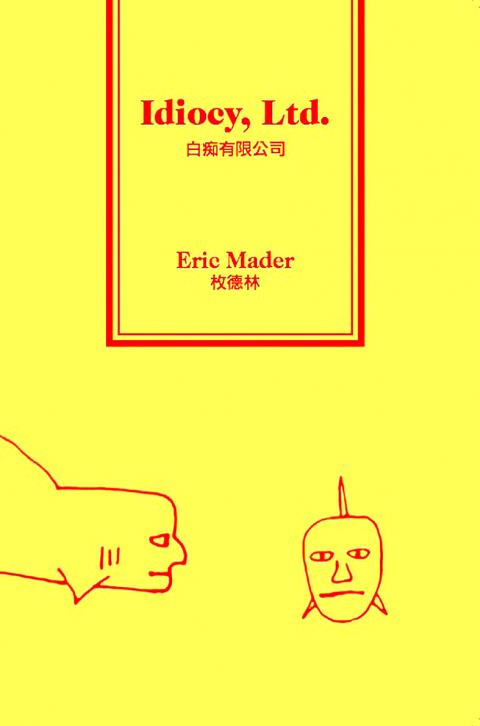This is a difficult book to review because Eric Mader is more intelligent than I am. He’s said somewhere that he narrowly missed having a career as a university academic. He now teaches English in Taipei, and you get the feeling that in publications such as Idiocy, Ltd. he’s compensating for the mundane nature of much of his work — forcing teens to “convert their Chinese syntax and thought patterns into passable English” — by allowing his intellectually playful mind to whirl at full throttle. The result is a wide range of experiences — some enjoyable, some incomprehensible. But perhaps the truth is that I am nearly as intelligent as Mader, just a lot less ingenious.
Mader recently became a Catholic, moving away from the US Midwest Protestantism of his forebears. Far be it for me to question the compatibility of high intelligence and the interconnected subtleties and incongruities of the Roman Catholic creed, if only because there are so many distinguished historical precedents. There are few references to this conversion here, only a glimpse of him reading Jesuit explicators of Thomas Aquinas on a plane, a reference to God having revealed himself in Scripture, and a ferocious diatribe against Richard Dawkins and the New Atheism (one of the best things in the book).
I had to check some of the assertions in this last piece, such as that there are various member circles that adherents of atheism can sign up for, culminating in breakfast or lunch with Dawkins for what Mader rightly calls a “staggering US$100,000 a year.” But he’s right in his details, it seems. Pope Francis, you think, would never descend to this.

The book consists of some 56 sections (you can’t call them chapters), some mere squibs, others longish dissertations on, to cite the most memorable of them, cats, red-neck Americans, and atheists. Mader says they’re two-thirds Kafka and one-third Monty Python. I sometimes found myself wishing they were entirely Monty Python, or perhaps entirely Kafka. As it is, this short book is certainly a roller-coaster ride of different sorts of reading experience.
Within these sections are hidden many little gems. There’s a set about animals, for instance, that contains the following: a rhino typically remains unimpressed, a lion’s swollen head is to hide its grossly oversized ego, an alligator is a moldy log with an attitude problem, earthworms refuse to tell us what they know, and bats burst from the hollowed trunks of long-dead trees like text messages sent from the cell phones of Hell.
But now the incomprehensibility issue. The shortest section was also, for me, the most incomprehensible. It reads, entire, as follows, and occupies a whole page:
Before the Recital/ A severed ear lying silently on the coffee table. “If you don’t know whose it is, don’t touch it!” my mother whispers.
I couldn’t make head or tail or this, and still can’t. Fortunately not much of the book is on this level of obscurity.
On the next level (thinking, perhaps, of Dawkins’s levels of membership) come sections that, while not obscure, seem somewhat pointless at best. Typical of these is one called Mr. Tsao and His Skull and concerns someone who takes his skull out for safe-keeping on a regular basis. I have to admit this was one of the instances where I thought to myself, and actually scribbled at the bottom of the page, “Why on earth do I have to read this?”
Generally I preferred the longer pieces, perhaps because Mader especially liked their topics and so extended them appropriately. And indeed on the whole I prefer Mader when he’s applying his mind to genuinely serious subjects, such as the existence or otherwise of a divinity. That’s why I liked his book Heretic Days [reviewed in Taipei Times Feb. 28, 2012] more than this new one. “Serious” topics do surface here from time to time, but mostly as un-ironic extrusions, sticking out from a largely ironic context.
Of the longer pieces in this book, Making the Grade in Naples, Florida stands out. It’s a dystopian piece on mindless American idiocy, and is also appropriately idiotic in its own narrative method. It’s s short-story of a kind, and features a man who gets arrested for being under-weight and reading European novels (“a felony since we pulled out of the UN during Jeb Bush’s first term”). Another prisoner is inside for being over-heard saying golf was a stupid game, and that he didn’t like barbecues.
Another piece, on writing a sonnet in grad school about McDonald’s, shows Mader’s literary and philosophical cast of mind, while the long item on cats, incorporating most of what has been said against them over the ages, is very entertaining. So too is another section called Why I Do Not Work for the CIA, and another that poses as a monologue by George W Bush and artfully and illuminatingly illustrates his mind-set. Mader is good on politics, and has written extensively on political affairs online. This book would have benefited from more on the subject.
Taiwan in particular features in a set of pieces entitled Taipei: City of Gentle Mayhem. The longest item here, called From Seth Descended, I found of varying interest and intelligibility. But the set is most marked for three pieces seemingly describing incidents in Mader’s daily life as a teacher that are all more or less straight narratives, without incongruities of any kind.
It’s worth pointing out that the author is interested in the work of the early-Soviet surrealist Daniil Kharms and the French prose-poet Max Jacob, and sees both as precursors of what he’s attempting here. But I’ve thought it fairer to treat Mader’s work as something written in its own right.
By and large, then, this book seems to me a light-hearted and relatively inconsequential digression from Eric Mader’s main concerns. What I’d really like to see from him are 200 pages on why he converted to Catholicism. Of course an old pagan like me would also like to read 300 pages from him on why he believes in Christianity in the first place. But that’s another matter.

Taiwan Power Co (Taipower, 台電) and the New Taipei City Government in May last year agreed to allow the activation of a spent fuel storage facility for the Jinshan Nuclear Power Plant in Shihmen District (石門). The deal ended eleven years of legal wrangling. According to the Taipower announcement, the city government engaged in repeated delays, failing to approve water and soil conservation plans. Taipower said at the time that plans for another dry storage facility for the Guosheng Nuclear Power Plant in New Taipei City’s Wanli District (萬里) remained stuck in legal limbo. Later that year an agreement was reached

What does the Taiwan People’s Party (TPP) in the Huang Kuo-chang (黃國昌) era stand for? What sets it apart from their allies, the Chinese Nationalist Party (KMT)? With some shifts in tone and emphasis, the KMT’s stances have not changed significantly since the late 2000s and the era of former president Ma Ying-jeou (馬英九). The Democratic Progressive Party’s (DPP) current platform formed in the mid-2010s under the guidance of Tsai Ing-wen (蔡英文), and current President William Lai (賴清德) campaigned on continuity. Though their ideological stances may be a bit stale, they have the advantage of being broadly understood by the voters.

In a high-rise office building in Taipei’s government district, the primary agency for maintaining links to Thailand’s 108 Yunnan villages — which are home to a population of around 200,000 descendants of the Chinese Nationalist Party (KMT) armies stranded in Thailand following the Chinese Civil War — is the Overseas Community Affairs Council (OCAC). Established in China in 1926, the OCAC was born of a mandate to support Chinese education, culture and economic development in far flung Chinese diaspora communities, which, especially in southeast Asia, had underwritten the military insurgencies against the Qing Dynasty that led to the founding of

It’s fairly well established that strength training is helpful at every age: as well as building muscle, it strengthens tendons and ligaments, increases bone density and seems to have protective effects against everything from osteoporosis to dementia. But a new study based on data collected over two decades in Rio de Janeiro, Brazil, suggests that another physical attribute might be just as important — and it’s one that declines even faster than strength as the years go by. The good news? It might also be less uncomfortable, and even slightly safer, to improve. Also, it will probably make you better